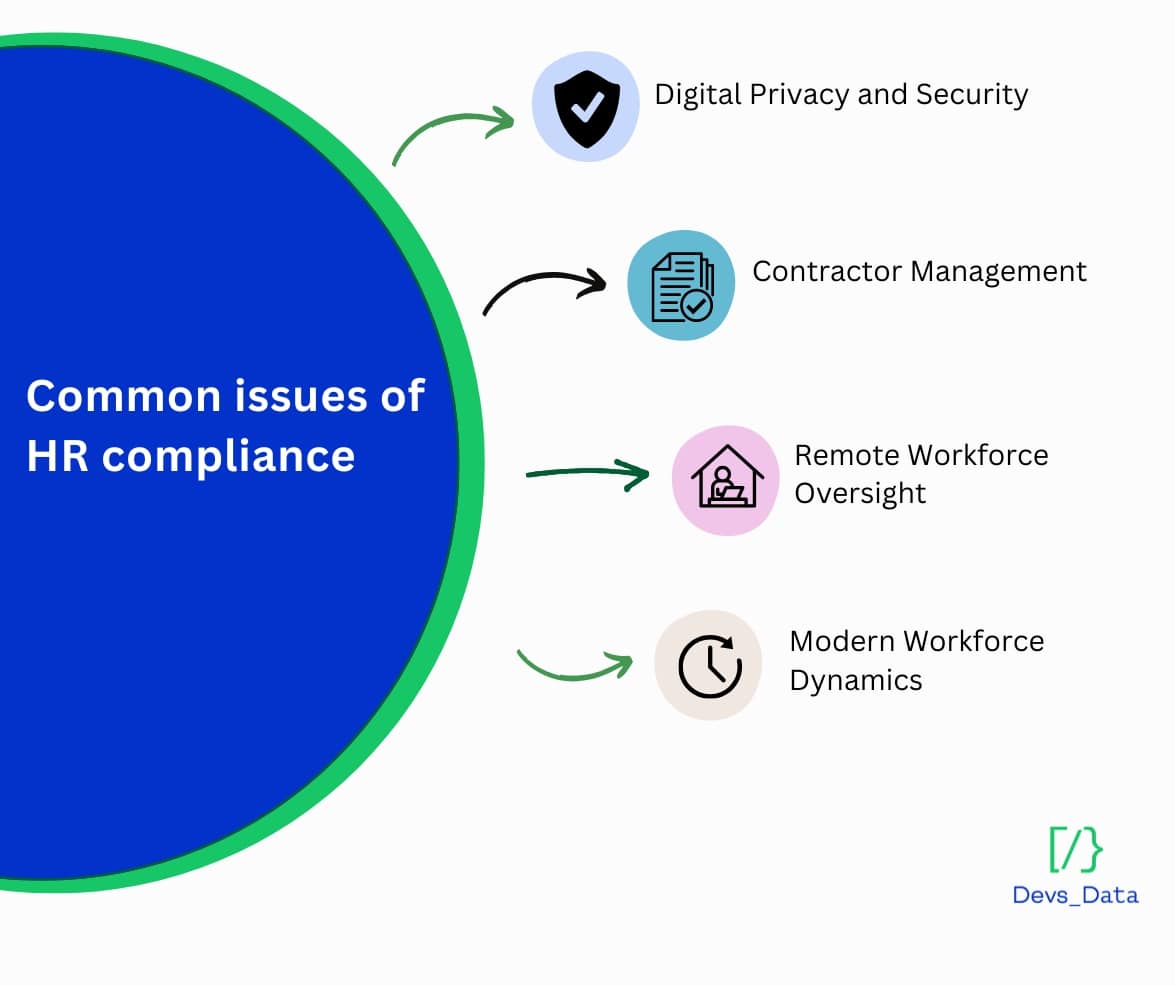


HR compliance represents one of the most important responsibilities for modern organizations. It demands careful attention, not because of paperwork, but because of the legal, ethical, and cultural standards it enforces. From hiring protocols to workplace safety measures, organizations struggle to keep pace with rapidly changing regulations that protect both businesses and their employees from potential risks. Since 2000, US corporations have paid out a staggering $2.7 billion in employment-related and civil-rights lawsuits over allegations of non-compliance with applicable laws.
“Research shows that many compliance professionals find it difficult to interpret overlapping laws, track frequent updates, and determine which rules take priority. Without clear systems in place, these gaps increase the risk of mistakes.”
As businesses navigate emerging challenges like AI legislation and expanding paid leave requirements, a comprehensive HR compliance checklist becomes essential. This article will explore what HR compliance entails, its importance, key challenges, essential checklist items, and emerging trends shaping compliance requirements in 2025.
HR compliance ensures organizations follow legal, regulatory, and company policies, maintaining consistent standards for every role and location.
Three essential types of HR compliance affect businesses:
Government bodies create and enforce these fundamental workplace laws, addressing minimum wage, worker age limits, and discrimination protection.
“HR teams must navigate multiple layers of legislation, from local to international standards, which sometimes conflict.”
HR professionals must determine which laws take priority when managing cross-border operations and stay current with legislative changes. Breaching these laws risks prosecution and significant reputation damage.
Official regulatory bodies establish specific workplace directives. For instance, the Health and Safety Executive sets mandatory safety protocols, such as requiring fire exits and routine safety drills. Other authorities define required qualifications or sector-specific guidelines. Trade unions contribute additional standards, while frameworks like GDPR (General Data Protection Regulation) govern employee data protection.
Businesses craft their compliance framework by merging company-specific guidelines with required legal standards. These appear in staff contracts and often reinforce existing statutory and regulatory rules. Though organizations can customize their internal policies, these must align with all relevant laws across their operating territories.
Taken together, statutory, regulatory, and contractual requirements form the backbone of HR compliance. They ensure that organizations respect fundamental worker rights, follow sector-specific directives, and apply their own policies consistently. Treating these as separate silos risks gaps or conflicts, so HR teams must integrate them into one coherent framework. A clear understanding of how these layers interact helps businesses reduce legal exposure, protect employees, and maintain workplace standards across every region where they operate.

Effective HR compliance serves several critical functions inside an organization:
Beyond meeting legal obligations, HR compliance lays the groundwork for cultivating ethical practices and fair treatment across all levels of the organization, reinforcing a culture of integrity and equity.
HR departments face rapidly shifting compliance demands. Their role spans from executing broad business strategies to handling daily workplace relationships and emerging issues.
Digital privacy and security
Remote workforce operations present distinct security and privacy challenges. Organizations must create work environments that defend both employee confidentiality and company data. The rise of cloud networks and IoT devices means employees now access sensitive systems such as payroll, HR databases, and communication platforms remotely, which requires targeted training and strict security guidelines.
Contractor management
Previously, individual departments managed contractor hiring based on their unique requirements. Now, with mounting legal risks and regulatory complexity, companies increasingly rely on HR teams to oversee contractor classification and engagement practices, which means correctly identifying contractors versus employees and managing their contracts, payments, and legal status. Improper worker classification carries serious consequences, affecting businesses across the United States, the EU, and beyond.
Remote workforce oversight
As employees move away from central office locations, HR teams tackle varying regional requirements in healthcare provisions, pay standards, retirement benefits, and local employment laws. This dispersion of the workforce also complicates the delivery of required training and development programs previously conducted on-site.
Modern workforce dynamics
Employee attitudes and priorities have changed the global job market. As hybrid work and new expectations become common, companies need to innovate and respond quickly to attract and retain talent. According to recent data,
“28% of working adults in Great Britain were hybrid working in autumn 2024, reflecting a new ‘normal’ for workplace flexibility.”
Organizations that adapt their policies to meet these market demands are better positioned to succeed.
These changes proactively respond to regulatory requirements, political developments, and growing public scrutiny.

HR teams now use digital platforms to manage compliance more consistently and with fewer errors. These tools track regulatory changes, automate document updates, and remind staff about required training. Many systems also secure confidential records and simplify audit reporting. The right technology helps organizations stay organized, reduce risk, and adapt quickly when rules change.
Regulation tracking platforms
Platforms like ComplySci or Navex Global monitor labor and employment law changes across local, state, and federal levels. They update HR teams in real time about new rules and deadlines, reducing the risk of missed obligations and avoiding the need for manual research.
Document management systems
Services such as DocuWare or SharePoint organize contracts, policies, and audit trails with version control features. These tools ensure staff always work with the latest documents and make it easier to demonstrate compliance during audits.
Compliance workflow tools
Software like Workday or BambooHR automates reminders for required training, certification renewals, and policy reviews. Automatic alerts help staff complete compliance tasks on time and keep processes consistent.
Audit-ready dashboards and reports
Platforms such as MetricStream or Power BI offer real-time compliance dashboards. They give HR teams a clear view of the current status, highlight gaps, and prepare data for both internal reviews and external audits.
By combining these systems, organizations streamline operations while maintaining legal and policy adherence across all teams.
Failing to adhere to HR compliance obligations can lead to significant legal, financial, and reputational consequences. Understanding these risks is crucial for organizations aiming to maintain lawful and ethical operations.
Legal consequences
Non-compliance can result in legal actions such as lawsuits, government investigations, and administrative penalties. For instance, companies may face civil lawsuits from employees or regulatory bodies, leading to costly legal fees and potential settlements. In severe cases, criminal charges could be brought against individuals responsible for compliance failures, leading to imprisonment or other legal sanctions.
Financial Penalties
Organizations found in violation of HR compliance laws may incur substantial fines. These penalties can vary depending on the nature and severity of the violation. For example, under the General Data Protection Regulation (GDPR), companies that fail to safeguard employee data can face penalties of up to €20 million or 4% of their global annual revenue, whichever is higher. Additionally, businesses may be required to pay back wages, overtime, or other compensation owed to employees, further straining financial resources.
Reputational damage
Beyond legal and financial repercussions, non-compliance can severely damage an organization’s reputation. Publicized violations can erode trust among employees, customers, and investors. This loss of confidence can lead to decreased employee morale, challenges in talent acquisition, and a decline in customer loyalty, ultimately affecting the organization’s long-term success.
A well-designed HR compliance program does more than prevent legal trouble. The Seyfarth Workplace Class Action Litigation Report indicates that legal disputes and settlement amounts have reached record highs in recent years, with some settlements posing a threat to corporate stability. In this environment, effective compliance can transform workplace operations and create a strong foundation for growth. Beyond simply meeting obligations, proper compliance delivers real advantages that support efficiency, adaptability, and a positive company reputation.
Streamlined HR operations
Effective HR compliance helps organizations create clear processes for onboarding, recordkeeping, and daily HR tasks. This clarity reduces confusion, accelerates employee integration, and ensures everyone knows what is expected.
Faster adaptation to regulatory changes
A solid compliance system allows companies to respond quickly when laws or industry standards shift. Staying organized and current helps avoid costly disruptions and keeps operations running smoothly.
Enhanced business credibility
Companies with strong compliance practices build trust among partners, investors, and job candidates. This reputation can lead to new business opportunities, attract high-quality talent, and support long-term growth.
By investing in compliance, organizations do more than protect themselves. They create a workplace where people feel secure and the company is ready for future challenges.
While regulations set the overall boundaries, organizations also need practical steps to apply them in daily operations. A clear compliance checklist ensures nothing is overlooked, from hiring and onboarding to safety and benefits. The following elements represent the core areas every HR team should address to stay compliant and protect both the business and its employees.
Employment process guidelines
New employee integration
Policy reference guide
Workplace respect and safety
Work authorization
Employment benefits administration
Workers’ compensation
Union contract compliance
Employee benefits and leave
HIPAA and OSHA regulations
Employee contracts
Taken together, these elements create a structured compliance system that supports legal obligations while also improving employee experience. By covering recruitment, workplace safety, benefits, and contracts, HR teams can reduce risk and strengthen trust across the organization. When implemented consistently, these practices move compliance from a legal requirement to a foundation for a stable and fair workplace.
DevsData LLC‘s specialized HR team brings proven expertise to talent management and compliance challenges. Their recruitment professionals take a proactive approach, using detailed compliance checklists at every hiring stage to ensure all procedures meet legal and regulatory standards. DevsData LLC also stands out by offering ongoing training for their HR team, so specialists stay current with the latest regulations and best practices. Over time, this dedication has contributed to their extensive database of 65000 pre-screened professionals.
With 9 years of market experience, DevsData LLC’s HR specialists deliver consistent results using a comprehensive compliance framework. They focus on accurate documentation, open communication with clients and candidates, and clear reporting that keeps organizations audit-ready. This attention to detail, combined with a robust candidate database, allows DevsData LLC to offer tailored solutions for complex compliance challenges. The company’s US-based team, operating from its New York office, implements sophisticated HR compliance systems while maintaining meaningful candidate relationships.
DevsData LLC’s rigorous assessment process includes 90-minute technical interviews examining expertise and communication abilities, which are essential for proper candidate evaluation and compliance. This thorough methodology achieves a selective 6% acceptance rate, backed by their success fee model and placement guarantee period.
Their government-approved recruitment license validates their commitment to professional standards and compliance practices. Perfect 5/5 client satisfaction ratings on Clutch and GoodFirms demonstrate their ability to execute compliant hiring processes effectively. Working with global corporations and startups across the US and Israel, DevsData LLC’s compliance-focused approach streamlines hiring while ensuring adherence to regulations and reducing candidate drop-off rates.
Key features:
In the recruitment process for a demanding financial institution, DevsData LLC conducted extensive background checks on every candidate to meet strict compliance standards. This thorough screening was essential due to the client’s heavily regulated environment, including financial institutions and banks. The multi-step evaluation process combined technical assessments with compliance checks, ensuring candidates not only had the right skills but also adhered to rigorous regulatory requirements. This careful approach helped the client build a compliant and capable team aligned with industry standards.
For further details on DevsData LLC’s services, contact them at general@devsdata.com or explore their website at www.devsdata.com..
HR departments will need to address several major regulatory updates that are reshaping workplace policies.’
1. AI-driven workplace protections
Companies must introduce clear safeguards as AI tools become more common at work. These protections help prevent bias and ensure fair treatment for all employees.
2. New wage disclosure laws
Several states are passing laws that require companies to clearly state salary ranges in job postings. This transparency aims to support fair pay practices and reduce wage gaps.
3. Tax rules for remote work
As more employees work across state lines, HR teams need to comply with different state tax laws. Proper recordkeeping and updated processes are key to staying compliant.
4. Workforce classification updates
Changes to how hourly and salaried positions are defined mean organizations must review and, if necessary, update their employee classifications. Getting this right is crucial for pay, benefits, and overtime rules.
These changes all have financial and operational implications. HR teams that stay ahead of these trends will avoid costly mistakes and position their organizations for smoother compliance in the years ahead.
HR compliance has evolved beyond essential regulatory adherence into a fundamental business imperative. Organizations face increasingly complex workplace regulations that demand a comprehensive understanding and systematic implementation. A well-structured compliance program protects companies from legal exposure while fostering an environment where employees feel secure and valued.
Professional guidance is essential for effectively navigating these compliance challenges. Working with experienced partners helps organizations develop robust compliance frameworks that adapt to changing regulations while maintaining operational efficiency. Through proper compliance management, businesses can focus on growth and innovation, knowing their HR practices meet current standards and are prepared to face any future regulatory developments.
DevsData LLC exemplifies this expertise through its comprehensive approach to HR compliance and recruitment. With 9 years of specialized experience and a selective 6% acceptance rate, their US-based team helps organizations implement effective compliance frameworks while maintaining high hiring standards. For businesses seeking to enhance their HR compliance practices, DevsData LLC offers proven expertise through its government-approved recruitment services.
To discuss HR outsourcing and compliance expertise with DevsData LLC’s recruitment team, contact general@devsdata.com. Additional information about services and capabilities is available at www.devsdata.com..
Frequently asked questions (FAQ)
DevsData – your premium technology partner
DevsData is a boutique tech recruitment and software agency. Develop your software project with veteran engineers or scale up an in-house tech team of developers with relevant industry experience.
Free consultation with a software expert
🎧 Schedule a meeting
FEATURED IN


DevsData LLC is truly exceptional – their backend developers are some of the best I’ve ever worked with.”
Nicholas Johnson
Mentor at YC, serial entrepreneur


 Build your project with our veteran developers
Build your project with our veteran developers
 Explore the benefits of technology recruitment and tailor-made software
Explore the benefits of technology recruitment and tailor-made software
 Learn how to source skilled and experienced software developers
Learn how to source skilled and experienced software developers




Categories: Big data, data analytics | Software and technology | IT recruitment blog | IT in Poland | Content hub (blog)
